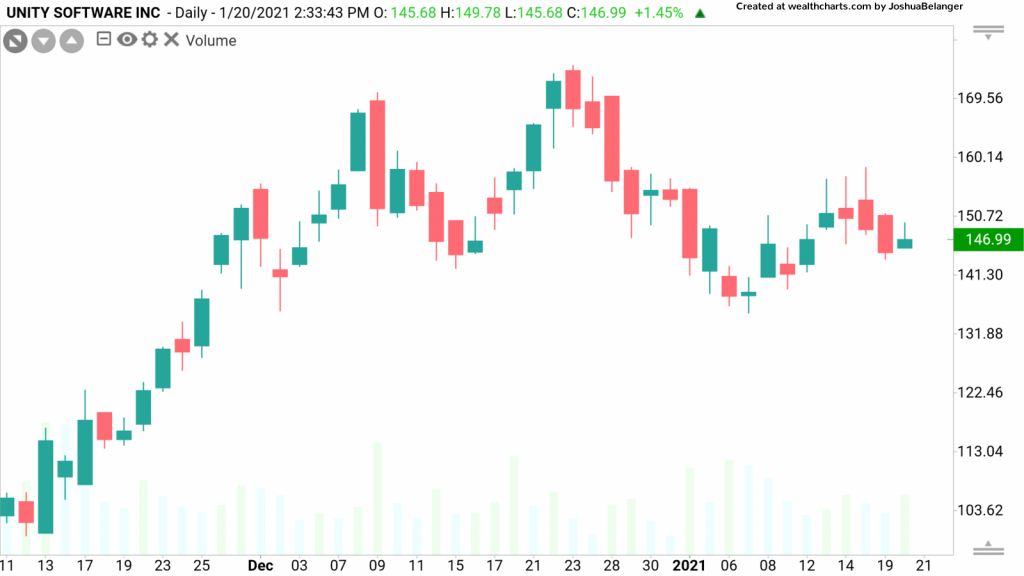Gaming has never been hotter than it is right now.
You’d have to go back to the 1980s and find yourself in an arcade to see this level of excitement.
But even that tipping point doesn’t truly compare to how big the opportunities are right now.
Over the last 12 months, companies like Electronic Arts Inc. (NASDAQ: EA), Activision Blizzard Inc. (NASDAQ: ATVI) and Take-Two Interactive Software Inc. (NASDAQ: TTWO) have watched as their revenue and share prices jump higher.
Of course, those game developers are only part of the story. We’ve also seen the companies behind these companies take off.
NVIDIA Corp. (NASDAQ: NVDA), maker of the CPUs and GPUs that allow gamers to game, was one of Wall Street’s darlings in 2020:
But only over the last month or so has another gaming company come to the forefront.
GameStop Corp. (NYSE: GME) owns brick-and-mortar game stores across the U.S. After a year of lockdown, during a time of digital downloads, its recent performance almost boggles the mind:

Shares have absolutely taken off, bringing investors quadruple-digit returns.
Clearly, something is askew here. And it explicitly points to a divergence in what to expect from the gaming industry in 2021.
There are a lot of flaky reasons for this recent spike. But there are indeed some real positives for GameStop right now.
The company is set to do very well in the short term as the newest generation of game consoles hit the market from Sony and Microsoft.
Its board was recently shaken up, including an activist takeover forcing a faster adoption of ecommerce and digital sales for the company.
That’s all to the good. And it certainly should represent some pro-GameStop movement in its stock. But what we’re seeing isn’t solely due to those short-term changes.
In fact, many are speculating that the largest reason shares are climbing so fast is due to record high levels of short sellers exiting their positions.

Grab a piece of paper and pen to write this down…
Because you’re about to see the name and ticker symbol of the ONLY 5G STOCK every investor should own.
You can get the name and ticker of this company right here, no strings attached. But you better act fast…
Because the Federal Communications Commission, the government agency in charge of 5G, just scheduled a major announcement that would send shares soaring once announced.
Don't miss out. Click Here to Get #1 5G play for 2020 before the next market close.
I’ve talked briefly about this phenomenon in the past, where those betting against a particular stock end up forcing shares higher when they exit their positions.
That’s likely a big reason why GME has climbed so fast in the last two weeks. But that is already started to transition into the inevitable decline.
Today, in fact, Citron Research, the short seller made famous last year with its game-changing report on Nikola Corp. (NASDAQ: NKLA), is livestreaming its attempted takedown of GameStop. It has already claimed that the company is worth no more than $20 per share, still much higher than where it traded a year ago.
Nonetheless, this inevitable retreat starkly contrasts with another recent player in the gaming industry to get some hype.
In some ways, Unity Software Inc. (NYSE: U) reflects NVIDIA more than the game developers. After all, Unity doesn’t create games. It provides a platform and engine those developers use to build their own games.
But Unity does so much more. And while it has climbed nearly as impressively as GameStop, it earned it.
As you can see, since its IPO, the company’s shares have only continued to climb. And that IPO was at a price well above where it was expected.
The company has proven its ability to change the game… in fact, it has proven it can look beyond games.
Over the last week, the company has announced two new partnerships.
The first came on Thursday with NuEyes.
NuEyes is a maker of augmented reality smart glass technology, crucial to one of the fastest-growing segments in the game industry.
The second, marking a huge change, came with Verizon to combine that ISP’s 5G network with Unity’s real-time 3D technology.
This moves Unity from just a solid platform for game developers to a next-gen player in the entertainment industry.
But, like GameStop, Unity faces a correction. While the company probably won’t see shares collapse as quickly and as far as GameStop, U shares should come back down following the IPO hype.
That’s an opportunity and a lesson on how to play this emerging industry.
Gaming is changing.
One way to play it is through a broken brick-and-mortar model built on shaky ground.
The other is through a company partnering with next-generation technologies.
If Unity shares do come down to their IPO level, that could be a unique quick-profit opportunity. Keep your eyes on it following these partnership announcements.
To your prosperity and health,
Joshua M. Belanger